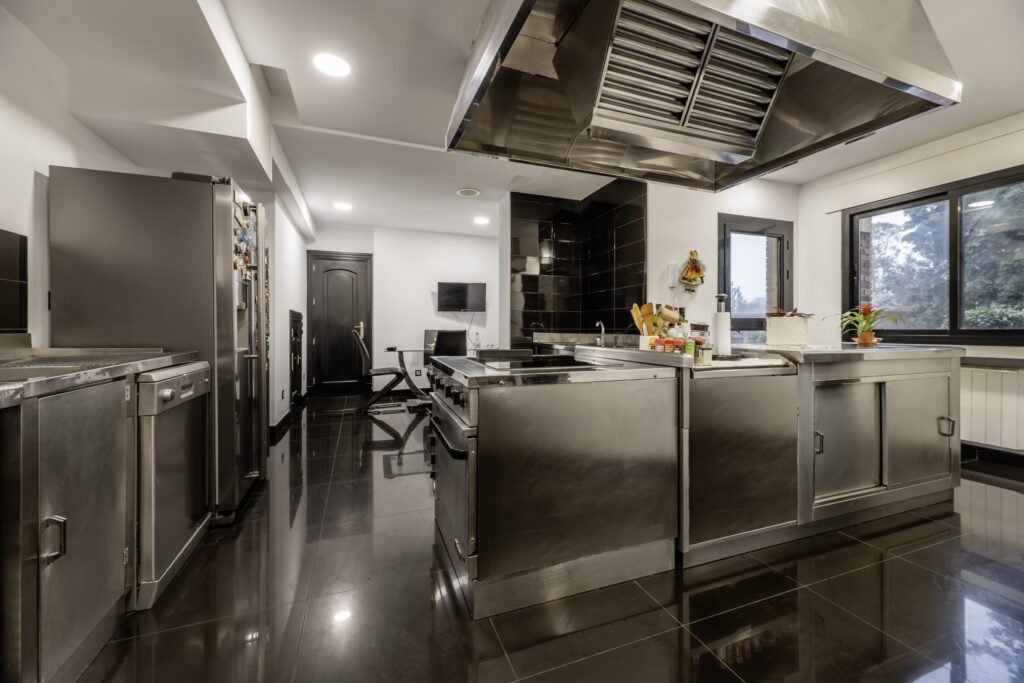Maintaining a safe and efficient commercial kitchen requires more than just daily tidying. One of the most critical, yet often overlooked, tasks is the regular cleaning of your kitchen hood and exhaust system. The frequency of this cleaning isn’t just a matter of hygiene—it’s a legal and safety requirement dictated by industry standards. Knowing the right cleaning schedule is essential for protecting your business, your employees, and your customers.
Why Hood Cleaning Is Important
Fire Safety and Code Compliance
The primary reason for regular hood cleaning is fire prevention. As commercial kitchens operate, grease-laden vapors are pulled through the hood and into the ductwork. Over time, this grease builds up, becoming a highly flammable fuel source. According to the National Fire Protection Association (NFPA) 96 Standard, a dirty exhaust system is the number one cause of restaurant fires. Regular cleaning removes this dangerous buildup, ensuring your kitchen remains compliant with fire codes and insurance requirements.
Air Quality and Efficiency
A clean hood system is a more efficient one. When grease clogs the filters and ducts, the system can’t properly pull smoke, steam, and odors out of the kitchen. This not only leads to a hotter, less comfortable work environment but also poor air quality for your staff and customers. Regular cleaning improves airflow, which helps maintain a clean, safe, and pleasant kitchen atmosphere.
NFPA 96 Guidelines
The NFPA 96 Standard for Ventilation Control and Fire Protection of Commercial Cooking Operations provides clear guidelines on cleaning frequency based on the type and volume of cooking.
Monthly for High-Volume Kitchens
Kitchens that use solid-fuel cooking (like wood or charcoal) or operate 24 hours a day, such as fast-food restaurants, must have their hoods and ducts cleaned monthly. This is because these operations produce a significant amount of grease and flammable residue in a short period.
Quarterly for Medium Use
Most restaurants fall into this category. If your kitchen uses high-volume cooking equipment like charbroilers and fryers, a quarterly cleaning schedule is required. This routine is sufficient to prevent major grease buildup in a typical full-service restaurant setting.
Semi-annual or Annual for Low Use
For kitchens with a low cooking volume, such as schools, churches, or senior centers that only use stoves or ovens, a semi-annual or annual cleaning may be sufficient. However, it’s always best to consult with a professional to determine the right frequency for your specific needs.
Signs Your Hood Needs Cleaning
Even with a set schedule, it’s important to recognize the signs that your hood system needs immediate attention.
Grease Buildup
Visibly sticky, gooey grease on the hood filters, around the hood, or dripping from the fan is a major red flag. This indicates that your system is overdue for a professional cleaning and presents a significant fire hazard.
Smells and Smoke Issues
If you notice a strong, stale grease smell lingering in your kitchen or see smoke accumulating instead of being properly vented, it’s a clear sign of poor airflow due to a clogged system. These issues compromise both the safety and comfort of your kitchen.
Professional vs. In-House Cleaning
While daily filter wiping and surface cleaning are good practices, they are no substitute for professional hood cleaning.
Deep Cleaning Process
Professional services use specialized equipment and chemicals to perform a deep cleaning of the entire system, including the filters, plenum, and inaccessible ductwork. They scrape, power wash, and degrease every component, leaving the system fire-safe and compliant.
Certificates and Inspections
After a professional cleaning, you’ll receive a certificate of performance. This document proves that your system meets NFPA 96 standards, which is crucial for fire inspections and insurance purposes. Many fire departments require this proof of service.
FAQs
How long does professional hood cleaning take?
The duration depends on the size and condition of the system. A typical cleaning for an average-sized commercial kitchen can take anywhere from 2 to 4 hours, often scheduled after business hours to avoid disrupting operations.
What happens if I skip cleanings?
Skipping professional cleanings can lead to severe consequences, including increased fire risk, violations of health and fire codes, hefty fines, and potentially even the shutdown of your business. Furthermore, insurance policies may not cover damages from a fire if it’s discovered that the hood system was not maintained according to code.
Don’t risk the safety of your business. Maid Cleaning For You provides professional, certified commercial kitchen hood cleaning to keep you compliant and safe. Contact us today for a free estimate and ensure your kitchen is protected!


